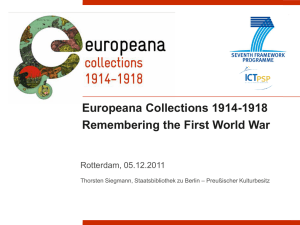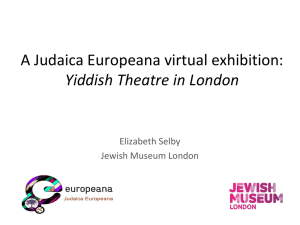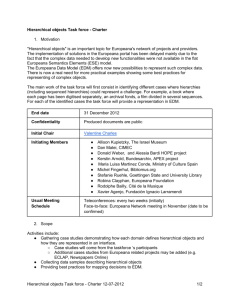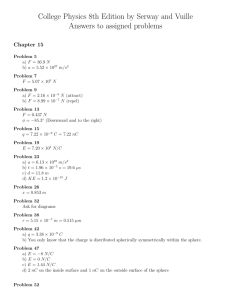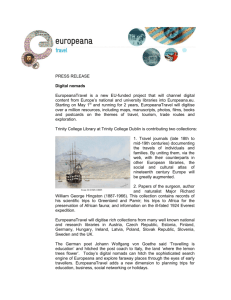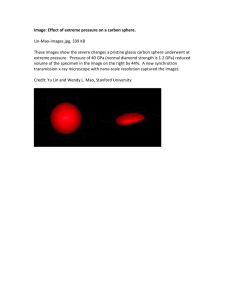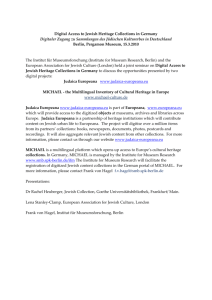The Library as Information Centre I
advertisement
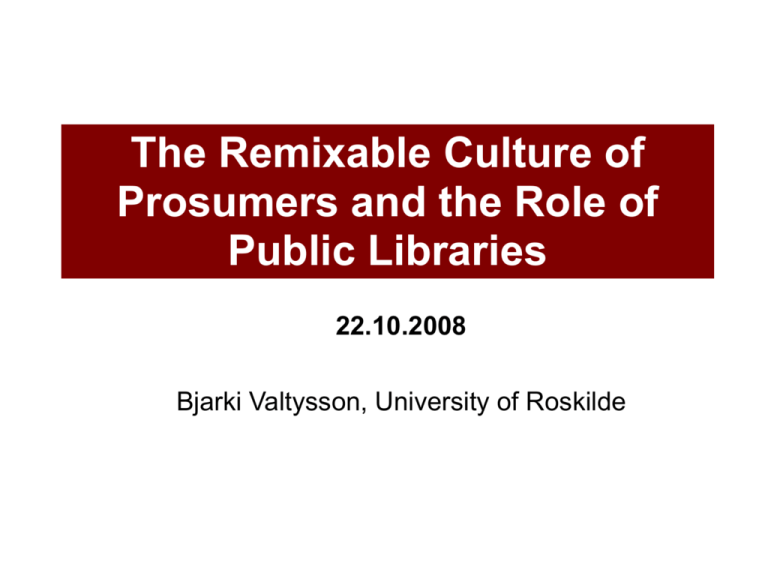
The Remixable Culture of Prosumers and the Role of Public Libraries 22.10.2008 Bjarki Valtysson, University of Roskilde Overview The Library as Information Centre: The Ideal Public Sphere The Degeneration of the Library? The Library as Information Black-Hole: Information Overload The Remixable Culture of Prosumers Europeana The Library as Information Centre I The library has always served a specific role Changes during different times, dependent upon different regimes of truth and different discursive formations Cultural and informational institutions Public access to books, multi-media and information stored in digital form Carries the heritage of the Enlightenment on its shoulders; enlightening and educating institution where the cultural heritage is not only chosen but also reshaped, reinterpreted and recommunicated The Library as Information Centre II Has affinities with what Jürgen Habermas calls the public sphere People's public use of reason The town – The cultural public sphere – The political public sphere Public venues – the coffee house – the salons – the table societies – cultural institutions – media Venues where societal status was disregarded, the domain of common concern became an object of public attention and everyone was able to participate. (Open and inclusive) The Library as Information Centre III The institutionalisation and the actual manifestation of the taste hierarchies that were formed in and by the rational-discourse taking place in the public sphere, was not as open and inclusive as Habermas maintains Power, cultural, political and economical capital has always mattered Which discursive formations were privileged, what kind of knowledge was accepted as valid? Here, the public library plays an important role... The Library as Information Centre IV In its ideal manifestation, the public sphere and the public library, have similar roles... ...to enlighten and educate the general public, to serve as a venue where people come together as a public, search information, talk, engage in social and cultural events, debate in a rational-critical fashion, thereby contributing to informed critical discussions... Pretty much as the case was with the coffee houses, salons and table societies in the 17th and 18th centuries The Degeneration of the Library? I The illusion of the inclusiveness and homogeneity Too much emphasis on discursive argumentation and rational-critical communication What about the role of passions, the affective, the irrational? Contradiction: As more people entered the public sphere, its quality diminished The market, the mass media, the state colonise the lifeworld and the inter-mediating public sphere The Degeneration of the Library? II Has the public sphere, and the role of the public library ever been a neutral, inclusive and open space? Or has it always been a place of limited access and limited selection procedures? What has happened to the public library in a culture-political landscape characterised by a shift from cultural democracy to market culture? Is it indeed increasingly looked upon as an ´experiencescape´? The Degeneration of the Library? III Experience / the public library as a strategic tool to sell a product Experience / the public library as setting, or staging Experience / the public library as content Is it degeneration, or has the role of the public library simply acquired more dimensions than serving as an ideal venue of rational-critical debate, a temple of enlightenment and education? Can the public library inform, entertain, educate and give experiences at the same time? To edutain? Should it? Cerritos Experience Library Cerritos Experience Library Cerritos Experience Library The Library as Information BlackHole I The Digital-Add on; the network society, the information society Where is the demand? Where are cultural products being made, remade, mixed, remixed, distributed and redistributed? Web 2.0 (platforms like YouTube, MySpace, Facebook, Flickr....) The network society feeds on informationalism where computers and digital communication are the most direct expressions, particularly their self-expanding processing and communicating capacities, their ability to recombine on the basis of digitisation and their enormous interactive, digitised distribution flexibility The Library as Information BlackHole II The culture of real-virtuality: captures most cultural expressions in their diversity; ends the separation between audiovisual media and printed media, popular culture and learned culture, entertainment and information No uniformity, only fragmentation A shift from content to process Michael Wesch. Video on Web 2.0 The Library as Information BlackHole III Challenges for the public library: Different copyright systems, the fringe of copyright, the scrambling concept of authorship, aesthetics, ethics, commerce, cultural governance and the cultural identity of the participating public Information streams do not pile up, they circulate The selection process becomes a lot harder Information-and-Disinformation The growing importance of information literacy The Remixable Culture of Prosumers I A shift from object-oriented culture (culture made of discrete objects existing independently from each other) to exchange-oriented culture (culture made out of continuos processes) The global network of new media and the nature of digital data Digital remixability becomes commonplace (a culture of copy-and-paste) The rise of the prosumer, i.e. users on Web 2.0 produce as well as consume The Remixable Culture of Prosumers II Volume of Prosumption: The selection process of librarians a lot harder in a gigantic volume of cyclical self-published digital material. Are blogs, vlogs, podcasts, individual homepages and all the uploaded files made by prosumers and distributed through the Internet supposed to be preserved and communicated for future generations? Nature of Prosumption: What is a public librarian to do with a remix of a remix of a remix, existing in different versions on different platforms, in different quality, widely available for other prosumers to get engaged with? Who is the author? What about copyright? Were is the artist and were is the audience? What about the status of the artwork? What about the cultural industries? Europeana I There are being developed databases and legal instruments that respond towards such remixable culture of prosumers The Europeana is supposed to be one of them Demonstrates many of the problems, and sadly, many of the answers Is in fact Europeana 1.0 Single access point that coordinates the different databases of different libraries in Europe Europeana II Not just a meta-database, but also the real thing Will open in November 2008 with 2 million items Will then expand to 6 million items “The EU's digital libraries initiative sets out to make all Europe's cultural resources and scientific records – books, journals, films, maps, photographs, music, etc., accessible to all, and preserve it for future generations” Kind of impossible! Europeana Europeana Europeana Europeana III Has anything changed? Web 2.0 interface is not the same as exploiting the remixable culture of prosumers 6 million items is not much at all All items in the demo version are in the public domain What about copyrighted material? What kind of access? What kind of remixes? What kind of selection procedure? The user is still only following pre-programmed paths. Can it be otherwise? Europeana 2.0 I Interesting potentials left unanswered “in due course, the intention is for users to contribute materials too (through an open-source approach, like Wikipedia)” Future library users will not be content with finding information, they want to produce information. The are not content with just consuming information, they want to produce information. Indeed, the want to prosume information Europeana 2.0 II Prosumers are doing this already in colossal volume on Web 2.0 platforms If the public library as an institution does not respond, it is neglecting its role as being sensitive towards changes in society This will not mean a total shift from content to process, from selection to unhindered access, object-oriented culture to exchange-oriented culture, but it will certainly mean that those concepts will have to be thought of as a whole as the remixable culture of prosumers has yet again diversified the scope of the modern public library
